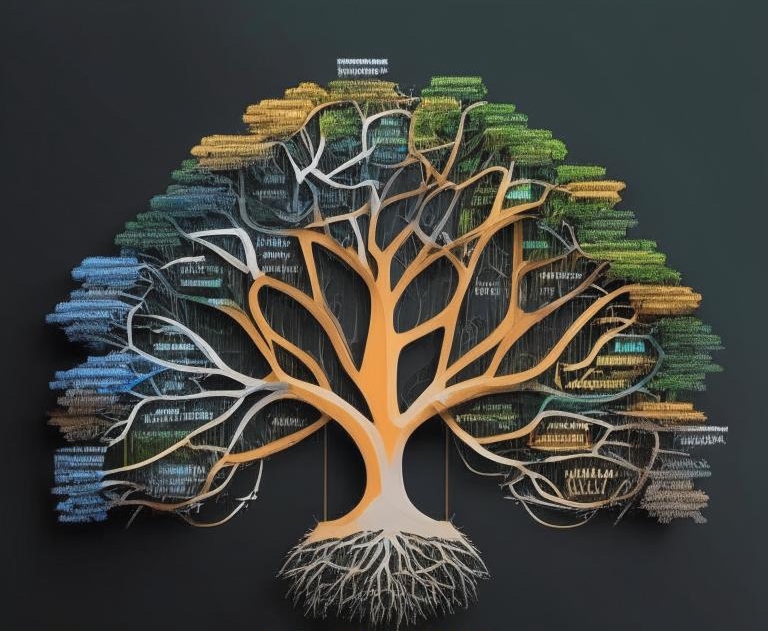Epistemology
by Oleg Sovetnik
The difficulties in identifying the true structure of a project are rooted in the challenges of cognition and describing reality. To describe the surrounding world, it must first be understood—a task philosophers have undertaken for millennia. Programming, which has existed for a much shorter time, has accumulated significant experience in understanding and modeling reality, but its methods often fall short when tackling deep and complex problems.
Epistemology is a branch of philosophy and a science that studies the processes of cognition and how humans form knowledge about the world. From its perspective, cognition is always structured and takes place through specific categories and concepts that shape how we perceive and interpret reality.
Umwelt acts as a conceptual framework—a kind of “glasses” through which we view the surrounding world. However, unlike abstract philosophical concepts, Umwelt is a living, dynamic structure formed by experience, language, and social interactions.
Umwelt and A Priori Knowledge
From the standpoint of Kantian apriorism, we perceive and understand the world through innate forms and categories of thought, which define the boundaries of our experience. Umwelt can be seen as one of these categories, forming a “grid” of perception that allows a person or system to structure reality. It not only reflects what exists in the world but also actively constructs reality through cognitive categories.
The Linguistic Turn and the Role of Language in Umwelt
One of the key philosophical shifts closely related to the concept of Umwelt is the linguistic turn. Language not only expresses thoughts and concepts but also shapes them, thereby creating our Umwelt. Through language, we assign meaning to the surrounding world, encoding it into concepts and structures that then become part of our model of reality. Umwelt and language are inextricably linked, and understanding how linguistic structures create semantic fields allows for deeper insights into how conceptual frameworks, through which we view the world, are formed.
The Social Aspect of Umwelt
But knowledge is not only cognitive; it is also social. One of the issues that Umwelt helps address is the Babylonian problem—the problem of a lack of common language and concepts in complex projects and interactions. Through Umwelt, project participants—whether clients, analysts, or programmers—can find a common language and create a unified conceptual field, enabling more effective interaction. This process assumes that knowledge is formed not only based on individual categories but also through social mechanisms of knowledge exchange and interpretation.
Umwelt as a Solution to Epistemological Problems
From an epistemological perspective, Umwelt solves two important problems:
- The Invisible Elephant problem—when we don’t have a concept for an object, we cannot comprehend it. Umwelt enables the creation of such concepts, making “invisible” elements visible and knowable. Once we have a concept of an elephant, we can “see” it in our model of reality.
- The Babylon problem—when project participants speak different languages and cannot reach a common understanding. Umwelt provides common conceptual frameworks, facilitating mutual understanding and eliminating communication gaps.
Where to Get Concepts for Umwelt?
Knowledge of the subject area, necessary for building Umwelt, is formed through social interactions and theoretical frameworks. To acquire the concepts through which Umwelt can be structured, we turn to sociology and social theory, which help us see objects in the subject area and make them objects of study. Social theory provides us with “glasses”—cognitive tools that help us meaningfully structure reality.
The difficulties in identifying the true structure of a project are rooted in the challenges of cognition and describing reality. To describe the surrounding world, it must first be understood—a task philosophers have undertaken for millennia. Programming, which has existed for a much shorter time, has accumulated significant experience in understanding and modeling reality, but its methods often fall short when tackling deep and complex problems. It’s akin to showing up at a gunfight armed with knives—programming tools are not always robust enough to handle the task of accurately modeling complex systems.
Epistemology, as the science of cognition, provides methods and approaches that help deepen understanding of the subject area and create an accurate and adequate model of it. In programming, we are also engaged in cognition: we study and model the subject area, creating systems based on this knowledge. But without a clear methodology of cognition, we risk creating models that do not reflect the true essence of the problems being solved.
Epistemology helps us understand how to properly structure knowledge about a subject, identify the key aspects that need to be considered in modeling, and determine the limitations imposed by the chosen approach. It becomes our guide in the process of understanding and modeling the subject area, providing a foundation for creating projects that are not only technically perfect but also conceptually coherent.
Thus, epistemology is necessary in programming to consciously and systematically approach the modeling of reality, ensuring more accurate and effective solutions in code. Without its tools, we risk being underprepared for solving complex problems, much like showing up with knives to a gunfight.
epistemology knowledge cognition structure
Dive deeper
-
Ways of Knowing
Different approaches to knowledge, including rationalism, empiricism, and a priorism.
-
Philosophical Turns
Each significant turn in the history of philosophy involved a rethinking of what knowledge is, how we acquire it, and how it can be structured. These turns can be seen as vectors that redirected the focus of thinkers towards new horizons.
-
The Battle for Lenses
Where are these a priori forms of knowledge about the world located, if not in the world itself and not in the mind of the knowing subject?
